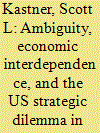|
|
|
Sort Order |
|
|
|
Items / Page
|
|
|
|
|
|
|
| Srl | Item |
| 1 |
ID:
075386


|
|
|
|
|
| Publication |
2006.
|
| Summary/Abstract |
As tensions across the Taiwan Strait have risen in recent years, some have argued that the US policy of strategic ambiguity-under which Washington leaves unclear if and how it would intervene in a cross-Strait conflict-has outlived its usefulness because ambiguity may foster dangerous misperceptions about US intentions and hence contribute to future crises. In this essay I critically examine strategic ambiguity, and conclude that ambiguity remains the best policy available to Washington given current US goals in the Taiwan Strait. I argue that ambiguity remains essential both to deterring a Chinese attack and to restraining Taiwanese moves toward independence, but that it nonetheless carries with it inherent risks of conflict. I further argue, however, that these additional risks triggered by ambiguity per se are likely small, and hence are overshadowed by the strategic obstacles faced by the alternatives to an ambiguous policy. Moreover, I show that growing economic interdependence between Mainland China and Taiwan further reduces the risk that ambiguity itself would be a contributing factor to war in the Taiwan Strait. As such, the relative attractiveness of ambiguity has likely increased, rather than decreased as argued by its critics, over the past decade.
|
|
|
|
|
|
|
|
|
|
|
|
|
|
|
|
| 2 |
ID:
075388


|
|
|
|
|
| Publication |
2006.
|
| Summary/Abstract |
While Taiwan continues to enjoy a liberal, consolidated democratic regime, citizen discontent continues to be directed at regime, government, and the governing. Identifying the scope and degree of dissatisfaction is an initial step in ascertaining whether discontented citizens might be more or less amenable to destabilizing change at the regime level or more procedural changes at the government levels. Taiwan's 2004 elections topped off four years of mud slinging, legislative gridlock, and a number of serious battles over constitutional jurisdictions and powers. This research note compares survey items from the Taiwan Election and Democratization Study (TEDS) surveys taken in 2001 and 2003 to measure levels of support for a democratic regime and governance within this environment. As party and ethnic identification are key cleavages on Taiwan, this study seeks to establish the relative strengths of the association between partisan and ethnic identification and attitudes towards regime and government. The main findings are: (1) dissatisfaction with regime and governance are more strongly associated with partisan identification than ethnic identification; (2) there exists a surprisingly low satisfaction and commitment to democracy; and (3) alienation from government exists at a moderate level.
|
|
|
|
|
|
|
|
|
|
|
|
|
|
|
|
| 3 |
ID:
075387


|
|
|
|
|
| Publication |
2006.
|
| Summary/Abstract |
The premise of this paper is that China has a divided national identity, characteristic of a category of nation-states divided for political reasons since World War II. Until 1999, responsibility for this sense of national division could be diffused, but since the retrocession of Hong Kong and Macao, frustration and blame have focused on Taiwan, the last remaining symbol of China's 'national humiliation'. Characteristic of such a divided identity are ambivalent feelings, aiming on the one hand to idealize and desire to incorporate the 'missing' or 'lost' segment of the nation, and on the other to punish it for refusing to return. It is important to understand that Chinese feelings about Taiwan are not a simple reflection of empirical developments on the island, but also project latent ideas about China's own unresolved national identity. China's attempts to overcome this division have undergone several changes, making significant progress while encountering difficult (and as yet still insuperable) obstacles.
|
|
|
|
|
|
|
|
|
|
|
|
|
|
|
|
|
|
|
|
|